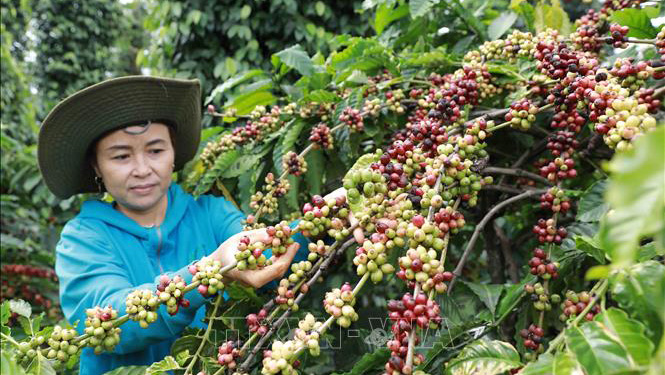HCMC – As many as 42 enterprises from the coffee and fruit-vegetable industries have signed a pledge to show their commitment to support and implement the codes of conduct (CoCs) on environmentally responsible businesses for the coffee and fruit and vegetable sectors in Vietnam, as they move toward a more sustainable environment for future generations.
The two codes of conduct were compiled by the Vietnam Rural Industries Research and Development Institute, the Vietnam Coffee-Cocoa Association, and the Vietnam Fruit and Vegetable Association, with financial and technical support from the Swedish Government and the United Nations Development Program in Vietnam (UNDP Vietnam).
Each CoC is an independent and voluntary set of standards to establish appropriate measures in micro-, small and medium-sized enterprises, cooperatives, and farmer households.
The objective of the CoCs is to promote the sustainable development of the coffee and fruit-vegetable sectors by advancing environmentally responsible business practices that mitigate the negative impacts of production and processing activities on the environment and human rights related to the environment.
These rights include the right to a safe, clean, healthy and sustainable environment and the right to the health of workers, farm households, local communities and related stakeholders in the sectors.
In addition, the CoCs aim to prepare businesses for the application process of relevant international certifications by aligning with international standards and the related provisions of the two new-generational free trade agreements to which Vietnam is a signatory: the European Union – Vietnam Free Trade Agreement (EVFTA) and the Comprehensive and Progressive Agreement for Trans-Pacific Partnership (CPTPP).
The CoCs were accordingly developed based on the unique characteristics of the sector, referring to a system of international and Vietnamese codes of conduct and standards related to the environment such as the LEAF Marque Standard, the Rainforest Alliance Sustainable Agriculture Standard, the GlobalGAP, the USDA National Organic Program, the Fairtrade Standard for Small Scale Producer Organizations, and VietGAP.
They are also in line with the relevant provisions of the EVFTA and CPTPP and were decided in consultation with 103 businesses and 24 experts in the fruit and vegetable sector as well as 80 businesses and 22 experts in the coffee sector.
The voluntary compliance of the CoCs assists businesses, cooperatives and farm households in achieving sustainable development through various benefits. These include producing high-quality products with increased product value; reducing production costs by increasing the crop resistance to changes in weather, climate, and pests; ensuring the sustainable use of natural resources such as land and water; and getting access to diversified consumer domestic and international market segments.
Each CoC includes seven principles, each of which is divided into basic criteria and basic implementation contents.
The principles include the conservation of arable land, water conservation and use of water, conservation of biodiversity, energy usage, use of pesticides, waste management, and ozone layer protection and increasing the resilience to climate change.
The CoCs are part of the project, “Advancing environmentally responsible business for the coffee sector and fruit and vegetable sector in Vietnam”, funded by the Government of Sweden and UNDP Vietnam.









